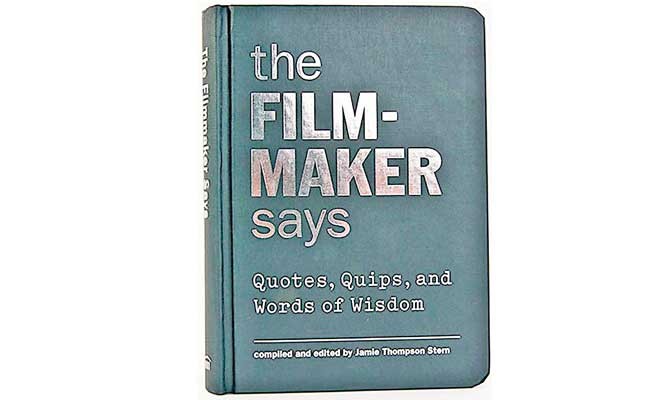
Jamie Thompson Stern’s The Filmmaker Says is a collection dedicated to some of the greatest filmmakers who ever lived

Have you’ve ever wondered how a discussion between filmmakers of the last 100-odd years would go? What if Alfred Hitchcock shares a table with James Cameron and they exchange notes on their style of filmmaking? That scenario may be the best thing to happen in Hollywood in a long time and if you’re curious enough, grabbing a copy of Jamie Thompson Stern’s The Filmmaker Says would be a smart bet. With this book, you too can enter the world of directors, producers and critics – personalities who you may never get to meet in real life.
This collection of quotations has dedicated a page each to what the greatest filmmakers have to say about films; sometimes the quotes contradict each other and on other occasion, they compliment one another. The writings enable readers to learn from the process and their individual and collective experience. You just may end up with a coherent understanding of films after reading through this collection.
Through this book, young filmmakers, aspiring directors and students of filmmaking can learn about masters of the craft, several of whom are no longer with us.
The anecdotes and little stories also add dimension to this book. Crowe predicts a future in which "everybody is going to be a director" but Jonathan Demme negates that by saying that he "didn’t go to film school" and was still learning.
Meanwhile Lord of the Rings and Hobbit master, Peter Jackson, believes that it is important to "develop a virtual mental image" before showing up on a film set while Michelangelo Antonioni didn’t carry "preconceived ideas of how the scene should be done".
The more you read, the more you discover. Mel Brooks and Charlie Chaplin, for instance, would not be thrilled if they were forced to sit across from each other in a party for both posses a different understanding of what constitutes comedy and tragedy.
According to this book, George Lucas, the man behind the original Star Wars juggernaut, thought that while learning to make films may be "easy", learning what to make a film about is "hard".
Current masters of our times, David O. Russell and Danny Boyle, had contradicting views about their first film. While the former states that his first few films were "harrowing experiences, because you don’t know what you are doing", the latter claims that your "first film is always your best. You never, ever get close to that feeling of not knowing what you’re doing again".
What would have happened had master of suspense Alfred Hitchcock made Cinderella? In his own words, the maverick director has said that in such a scenario, "people would look for a corpse".
Jean-Luc Goddard claims that "photography is truth. The cinema is truth 24 times per second" while in Brian De Palma’s words, "Film lies 24 times a second."
The tricky part is knowing who to believe and when.
Then there are 11 rules for Box Office Appeal by Preston Sturges. Examples like "A chase is better than a chat" and "An arrival is better than a departure" add color to the book. In his humble opinion, such facts lead to good business at the box office, which is refuted by award-winning director Roman Polanski who feels that ‘"the best films are best because of the director".
Those are big words, coming from a big man and believe me there are many such quotes that will prompt you to a) learn about these directors and b) watch their work so that you understand them fully.
Master director David Lean once said, "I love making movies. If I wasn’t paid to do it, I would pay to do it." Now that’s some big-talking by the person responsible for The Bridge on River Kwai, Lawrence of Arabia, Doctor Zhivago and A Passage To India. His words of wisdom are, however, not on the same wavelength as William Goldman’s and John Ford’s. Goldman feels "nobody knows anything" while John Ford thinks "most of the good things in pictures happen by accident". Yes, some of it is absurd but that’s part of the charm.
This golden collection of filmmaking quotes has different shades: Frank Capra says "there are no rules in filmmaking" while Otto Preminger proudly announces that he doesn’t get "ulcers" because "I cause them" and Kenneth Branagh compares actors to kids.
Adolph Zukor is no more alive but when he was, he said that "the public is never wrong" whereas George Cukor was of the opinion that "the director is always right".
So, whose side are you? Go through this book and form your own opinion; there are as many as 150 quotes by the leading men of Hollywood who were always behind the scenes unlike the reel-life heroes. Some of them never shied away from speaking their mind.
If you love to update your status and prove to your friends that you are into movies, if you want to impress your superiors at work with your insight on films, then look no further as this is the ideal book for you and is guaranteed to brighten your day, night and movie time.